 MyDogBreeds
MyDogBreeds Entlebucher Mountain Dog is originated from Switzerland but Bichon Frise is originated from Spain. Entlebucher Mountain Dog may grow 20 cm / 8 inches higher than Bichon Frise. Entlebucher Mountain Dog may weigh 20 kg / 45 pounds more than Bichon Frise. Entlebucher Mountain Dog may live 6 years less than Bichon Frise. Entlebucher Mountain Dog may have more litter size than Bichon Frise. Entlebucher Mountain Dog requires Moderate maintenance. But Bichon Frise requires Low maintenance
Entlebucher Mountain Dog is originated from Switzerland but Bichon Frise is originated from Spain. Entlebucher Mountain Dog may grow 20 cm / 8 inches higher than Bichon Frise. Entlebucher Mountain Dog may weigh 20 kg / 45 pounds more than Bichon Frise. Entlebucher Mountain Dog may live 6 years less than Bichon Frise. Entlebucher Mountain Dog may have more litter size than Bichon Frise. Entlebucher Mountain Dog requires Moderate maintenance. But Bichon Frise requires Low maintenance
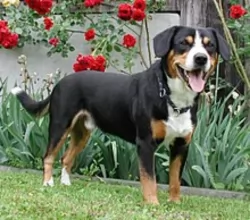 The Entlebucher Mountain Dog is the smallest of the Swiss Mountain Dogs, but he is still a powerful dog used to herd cattle. The four breeds are the Bernese Mountain Dog, the Greater Swiss Mountain Dog, the Appenzeller Mountain Dog and the Entlebucher. It was though that these dogs came to Switzerland with the Romans over 2 centuries ago. The Entlebucher was put to work guarding and herding sheep, pulling carts and flocking cattle. Toward the end of the 19th century the breed was on the edge of extinction because many were breeding them with German Shepherds. So, Franz Schertenleib, in 1889 brought all the existing Entlebuchers together and bred them. He is credited with keeping the breed alive.
The Entlebucher Mountain Dog is the smallest of the Swiss Mountain Dogs, but he is still a powerful dog used to herd cattle. The four breeds are the Bernese Mountain Dog, the Greater Swiss Mountain Dog, the Appenzeller Mountain Dog and the Entlebucher. It was though that these dogs came to Switzerland with the Romans over 2 centuries ago. The Entlebucher was put to work guarding and herding sheep, pulling carts and flocking cattle. Toward the end of the 19th century the breed was on the edge of extinction because many were breeding them with German Shepherds. So, Franz Schertenleib, in 1889 brought all the existing Entlebuchers together and bred them. He is credited with keeping the breed alive.
It is believed that the breed comes originally from a valley in the District of Cantons Lucerne and Berne, called Entlebuch. They were considered the same breed as the Appenzell Cattle Dog until 1913 when they were classified as a Mountain Dog – the fourth breed of Mountain Dog. The AKC did not recognize the breed until 2011.
 Contrary to the myths and many of the tales of the history of the Bichon Frise, the breed was originally developed in Spain. Later specific trait development occurred in France to give us the lap dog Bichon Frise that we know today. The original Spanish dog – the Bichon – was a water – sailing dog. It was descended from the poodle breeds crossed with either the water spaniels or the Barbet. These early dogs were friendly and happy and because of this, sailors carried them with them on their ships and even bartered them for supplies. Prior to the 14th century the Spanish probably brought them to the Canary Islands. Later in the 14th century they we discovered again by Italian sailors who returned them to Europe where they lived in the courts of the nobility. During the Renaissance and after the French fell in love with the breed while the Spanish continue to enjoy their presence.
Contrary to the myths and many of the tales of the history of the Bichon Frise, the breed was originally developed in Spain. Later specific trait development occurred in France to give us the lap dog Bichon Frise that we know today. The original Spanish dog – the Bichon – was a water – sailing dog. It was descended from the poodle breeds crossed with either the water spaniels or the Barbet. These early dogs were friendly and happy and because of this, sailors carried them with them on their ships and even bartered them for supplies. Prior to the 14th century the Spanish probably brought them to the Canary Islands. Later in the 14th century they we discovered again by Italian sailors who returned them to Europe where they lived in the courts of the nobility. During the Renaissance and after the French fell in love with the breed while the Spanish continue to enjoy their presence.
In the late 19th century in France the breed fell out of popularity and became street dogs and circus and fair dogs. They also worked with organ grinders and assisted the blind. In the early 20th century, the Societe Centrale Canine, the National Kennel Club of France, adopted the breed’s official standard – while they were still known as both the Bichon and the Tenerife. The popularity of the breed at this time is heavily attributed to “The Adventures of TinTIn” , by Herge, which featured a small, white, fluffy fox terrier. Then the president of the Federation Cynoloqique Internationale presented a new name for the breed based on its characteristics. The name Bichon Frise kept the Bichon heritage and added “curly” the meaning of Frise. Under this name the breed was admitted to the Societe Centrale Canine stud book in October of 1934.
The Bichon Frise came to the United States for the first time in 19554 and was admitted to the American Kennel Club Stud Book in 1972. They entered the non-sporting group of the AKC in 1973. By 2001 the Bichon Frise, J.R., won the Westminster Dog Show. In 1976, the Bichon Frise came to Australia, imported by Harry and Margaret Begg who oversaw the growth of the breed there. Today there are 4 separate breeds believed to be descended from the original Bichon/Tenerife breeds – the Bichon Frise, the Bichon Bolognaise, the Maltese and the Havanese.
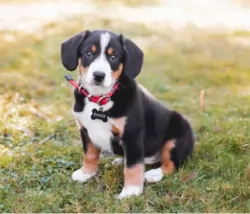 The Entlebucher Mountain Dog is a muscular, compact, and medium sized dog. Their heads are square, and the skull is flat. He has dark eyes that are alert and expressive in a friendly way. Their ears are triangular and hang on the side of his head. With compact feet, a muscular body and well angled hocks, he is a good looking dog and ready for his jobs.
The Entlebucher Mountain Dog is a muscular, compact, and medium sized dog. Their heads are square, and the skull is flat. He has dark eyes that are alert and expressive in a friendly way. Their ears are triangular and hang on the side of his head. With compact feet, a muscular body and well angled hocks, he is a good looking dog and ready for his jobs.
His coat is striking, and it is familiar in its closeness to the other Mountain Dogs coats. Yet he has some distinctive differences that tell you this is not a Bernese or a Swiss, it is an Entlebucher.
 The modern Bichon Frise is a white, small dog with a round skull and muzzle. The nose should be black and the eyes round and dark. Depending on the size of the dog, the legs and head are proportionate to the body, while the tail should be curly and long. Both the tail and the ears must not be docked. Their coat is as hypoallergenic as a dog gets. It is white, dense and for most Bichon Frise, it is curly. They should have black lips as well.
The modern Bichon Frise is a white, small dog with a round skull and muzzle. The nose should be black and the eyes round and dark. Depending on the size of the dog, the legs and head are proportionate to the body, while the tail should be curly and long. Both the tail and the ears must not be docked. Their coat is as hypoallergenic as a dog gets. It is white, dense and for most Bichon Frise, it is curly. They should have black lips as well.
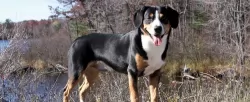 The Entle is a happy, clever dog that needs a job. They are intelligent and physical. They love people and throw themselves at you when they see you. They are loving and loyal but again he has to have a job.
The Entle is a happy, clever dog that needs a job. They are intelligent and physical. They love people and throw themselves at you when they see you. They are loving and loyal but again he has to have a job.
He makes a great watchdog, therapy dog or companion for your children. He only barks when he has to but is wary of strangers and he is territorial.
 The Bichon Frise, according to the American Kennel Club is a cheerful and merry dog. They are gentle, playful, sensitive and affectionate. These dogs love people, are very social and like other dogs as well. They love to play with children and they are intelligent and affectionate. They were developed in their latter stages by the French to be “lap dogs” or companion animals. They are not territorial by nature but can become so if confined and encouraged. Start obedience training early and be consistent throughout their lives. They take to training easily if positive techniques are used. They do however, have a reputation for not taking well to housetraining. Be persistent
The Bichon Frise, according to the American Kennel Club is a cheerful and merry dog. They are gentle, playful, sensitive and affectionate. These dogs love people, are very social and like other dogs as well. They love to play with children and they are intelligent and affectionate. They were developed in their latter stages by the French to be “lap dogs” or companion animals. They are not territorial by nature but can become so if confined and encouraged. Start obedience training early and be consistent throughout their lives. They take to training easily if positive techniques are used. They do however, have a reputation for not taking well to housetraining. Be persistent
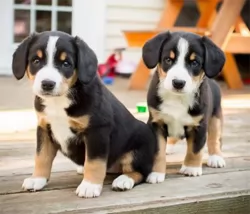 Common to large dogs. Can cause lameness and arthritis.
Common to large dogs. Can cause lameness and arthritis.
The immune system destroys its own blood cells.
This is inherited and causes degeneration of the retina. There is new medication for this.
 The coat of the Bichon Frise can easily become matted if not brushed or combed every day. Severe matting can lead to a hematoma in their ears. They are also very prone to ear infections so paying a lot of attention to their ears is imperative. They are will chew and scratch themselves if not groomed well and this can cause skin infections and conditions. They might have allergies to fleas, pollen, chemicals, and dust. The patella (knee cap) can be loose, diabetes, cataracts and heart disease also affect the Bichon Frise. In the United Kingdom the number one cause of death for the breed is old age -13 plus years, with 21% dying of cancer. In North America cancer is the number one killer as it is for most dogs. The Bichon might also be afflicted with hematologic disorders such as AIHA (Autoimmune hemolytic anemia) and ITP (Immune-mediated thrombocytopenia) which while less common than cancer will kill the dog much earlier in life than cancer. The other condition that the Bichon Frise is prone to are liver shunts. If found early they can be surgically corrected but most are not, and liver failure is eventually the cause of death.
The coat of the Bichon Frise can easily become matted if not brushed or combed every day. Severe matting can lead to a hematoma in their ears. They are also very prone to ear infections so paying a lot of attention to their ears is imperative. They are will chew and scratch themselves if not groomed well and this can cause skin infections and conditions. They might have allergies to fleas, pollen, chemicals, and dust. The patella (knee cap) can be loose, diabetes, cataracts and heart disease also affect the Bichon Frise. In the United Kingdom the number one cause of death for the breed is old age -13 plus years, with 21% dying of cancer. In North America cancer is the number one killer as it is for most dogs. The Bichon might also be afflicted with hematologic disorders such as AIHA (Autoimmune hemolytic anemia) and ITP (Immune-mediated thrombocytopenia) which while less common than cancer will kill the dog much earlier in life than cancer. The other condition that the Bichon Frise is prone to are liver shunts. If found early they can be surgically corrected but most are not, and liver failure is eventually the cause of death.
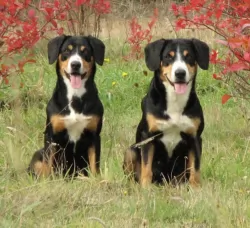 The Entlebucher Mountain Dog is a large working dog. He needs good solid food, but he doesn’t need to be overfed. Give him about 2-3 cups per day fed in 2-3 meals. Be careful of Bloat in the large dog.
The Entlebucher Mountain Dog is a large working dog. He needs good solid food, but he doesn’t need to be overfed. Give him about 2-3 cups per day fed in 2-3 meals. Be careful of Bloat in the large dog.
The Entlebucher Mountain Dog is prone to these issues as well as those mentioned earlier.
Entlebucher Mountain Dogs love to play, to work and to exercise. They are great with people who want to walk them every day, run with them, ride bikes or hike. They can play for hours or work for hours. They need a lot of activity every day and excel at tracking, obedience, herding and agility.
 Being a small dog, the Bichon Frise is susceptible to obesity and that condition will be terminal in the end for this breed. So make sure you do not overfeed your Bichon Frise. The same is true with the use of treats. The Bichon loves treats and loves the association with treats of having pleased you. They should be fed small meals – about ¼ cup of good high quality dry food twice a day.
Being a small dog, the Bichon Frise is susceptible to obesity and that condition will be terminal in the end for this breed. So make sure you do not overfeed your Bichon Frise. The same is true with the use of treats. The Bichon loves treats and loves the association with treats of having pleased you. They should be fed small meals – about ¼ cup of good high quality dry food twice a day.
As previously mentioned the Bichon Frise is susceptible to:
Hematomas and infections of the ear if not groomed well and consistently.
Cancer is number one killer.
Hematological Issues are deadlier than cancer.
Liver shunts are a very serious concern.
Though the Bichon Frise is not an overly active dog, they do love to play. They are characterized by short bursts of activity followed by long periods of rest. They can be worn out just by running around the house. You must play with them everyday as well as take them on a walk each day. Bichons are fast and agile and do well in agility trials. They also like to compete in rally and obedience trials. Most of all they love to and need to play with their people every day.